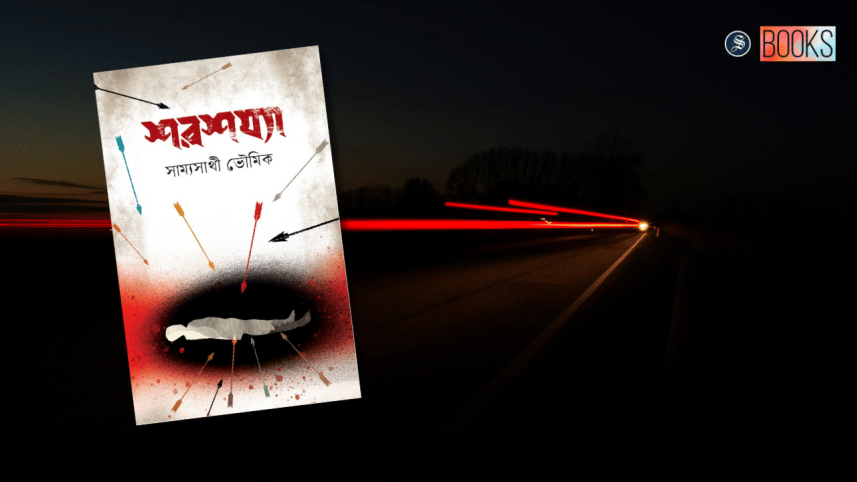Silent verses on a bed of arrows

'Shoroshojya', in the literal sense of the word, refers to the act of lying on a bed of arrows. It comes from Bhisma, a character in The Mahabharata, who had asked for 'ichcha mrityu' (death by one's own wish) when granted a boon by his father. In the War of Kurukshetra, Arjun had pierced Bhishma's flesh with so many arrows that his back would not touch the ground when he finally collapsed. Instead, he lay on a bed of arrows, writhing in excruciating pain until the city of Hastinapura was secured; and so, he could finally choose death.
"It's such a pathetic moment," said Akashleena Bhowmik, recalling this tale from The Mahabharata. "This is the bed of arrows that Baba compares his own dire situation with, and why he decided to name his book Shoroshojya."
As she continued to talk about her father Samyasathee Bhowmik, his new book, and the thought behind its title, Akashleena emphasised, "Shoroshojya is more than just a book. It's the war we've fought, the emotions we've felt, and it is the story of a person who fought for his life in the ICU for 56 days before returning to us, and to poetry."
So goes Shoroshojya's backstory. Its author, Samyasathee Bhowmik, is an established poet, and had been an associate professor at the Rajshahi College when he was diagnosed with Motor Neuron Disease (MND), a degenerative condition that affects the brain and nerves and causes muscle weakness, leading to the rapid deterioration of his health. Prior to his illness, Samyasathee's life had revolved around his love of both studying and teaching literature, as well as writing and translating poetry. He published three volumes of poetry, namely, Suprovat, Jibito Lok! in 2021, Amra Sorbonam in 2022, and Shorbongshoha in 2023 from Anyaprokash, during the Amar Ekushey Boi Mela. He also translated 25 Lalon songs, which were published in the book Baul Sangeet, published by Shilpakala Academy in 2010.
The disease began with weakness in the muscles, but it was not long before Samyasathee struggled to perform routine, everyday tasks, and soon after, he could no longer find the strength to lift his pen. Following his MND diagnosis, his family's brutal journey through the medical system was filled with challenges, and involved several trips to India which did not prove to be entirely fruitful. One instance Akashleena recalls is how, after they had decided to return to Bangladesh for further treatment, her father's condition went through sudden, traumatic fluctuations and subsequent deterioration; this led to him being admitted to the ICU and put on life support. Struggling to navigate the hospital system and find assistance in the middle of the night, Akashleena went on Facebook live to ask friends and followers for help. In an incredibly heartwarming turn of events, the family received an outpouring of support from numerous students, colleagues, and relatives who arrived at the hospital by dawn, and with their help, Samyasathee was successfully shifted to Rajshahi Medical. However, his condition continued to deteriorate and the poet once again had to be relocated to a hospital in Dhaka.
His ICU stay lasted a gruelling 56 days, in the midst of which he required a tracheostomy for a portable ventilator, rendering him unable to speak or communicate with his family. As Samyasathee's seemingly unending stay at the ICU stretched longer, the poet grew more distressed and depressed by the minute. After he was brought home from the ICU and a similar medical set-up had been installed at their house, his family decided to encourage him to return to his poetic habits. Even prior to his stay at the ICU, when the strength in his fingers had diminished and the poet could no longer lift his pen, he had dictated his poems to his family so that they could be recorded.
The tracheostomy, however, posed a seemingly insurmountable challenge: How could someone communicate their poetry to another when they could not speak?
Akashleena's studies in Communication Disorders at the University of Dhaka proved to have given her some unique insight into the situation. Using what she had been taught at university, she learned to work out ways to communicate with her father; before long, the two had returned to the task of recording his poetry. But this, too, was an arduous task. Poems that had taken minutes to transcribe when Samyasathee dictated them now took hours. As Akashleena attempted to lip-read the poems her father tried to communicate, each letter, word, and line had to be discerned with great difficulty. These poems, together with the ones that had been collected prior to Samyasathee's ICU stay, comprised the poet's fourth book, Shoroshojya.

The poems compiled in this volume reflect the struggle and the pain that not only Samyasathee, but his entire family has suffered through in the past year and longer. What both the book and Akashleena also highlight is the resolve and resilience exhibited by Devayani Chakraborty, the poet's wife, throughout this ordeal. Shoroshojya's dedication page reads:
Dekhte dekhte kete geche dui jug
Boyosh bare ni tar, bereche shomoy
Jatrar shurute jei mukh
Nire phire dekhi, shetai asroy
The first letters of each line spell out Devayani, or "Debjani", as it is pronounced in Bangla.
Akashleena adds, "My mother's struggle was different, far more different than everyone else's. The struggle she continues to keep up for my father is unimaginable."
Shoroshojya has been available at this year's Boi Mela since February 6, and will be available throughout the month. Readers can find the book at Anyaprokash.



 For all latest news, follow The Daily Star's Google News channel.
For all latest news, follow The Daily Star's Google News channel.
Comments